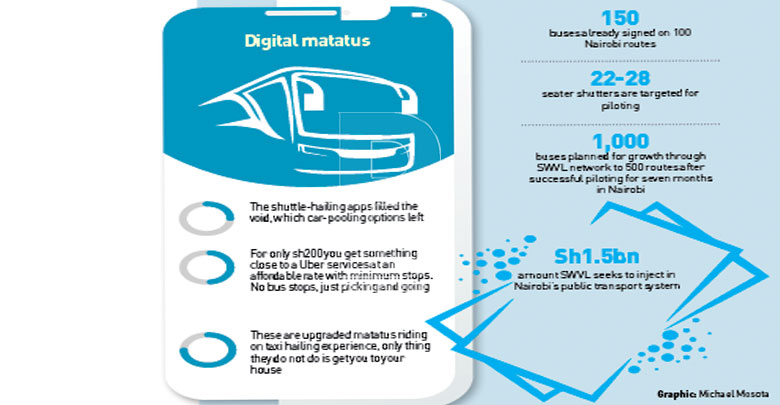Shuttle-hailing Apps turn mass transit on its head

@faminga
Kenya’s multi-billion-shilling matatu industry is being sized up for a digital disruption with shuttle-hailing applications eying the chaotic but moneyed sector.
Two Apps are already piloting and recruiting fleets, which have since been picking commuters from the convenience of their estates to their destination and back.
As opposed to the madness which has become the norm, the new kids in the block propose convenience, cleaner and more spacious vans, devoid of the hustle which has in the past driven the matatu industry.
In trying to bring what is a hybrid between a taxi and a matatu, the e-hailing services bring cheaper offers to compete with popular forms of transport.
For Kenyans, ride-hailing app Little under the aegis of Safaricom, and SWVL, an Egyptian online service provider, have shuttles plying Nairobi routes on pre-booked service.
They bring a semblance of sanity amid otherwise privately owned buses which are, however, operated by touts and drivers, with aggressive and abrasive market measures.
Double prices
They are known to double prices when they feel like and driving badly to get more trips daily and make more money.
The sector has started feeling the heat with the new entrants and just like the entry of taxi-hailing apps, the matatu industry is uncomfortable with the development.
Speaking to Business Hub, matatu welfare lobbyist Dickson Mbugua said they are trying to get an appointment with the Transport Cabinet secretary James Macharia over the new entrants.
“We are objecting the services. It will finish matatus and take away employment for youths. We have already sent a letter to the ministry to evoke discussions,” he said. ”
Past attempts by the matatu sector to leverage on technology did not work out as the touts and drivers sabotaged efforts to take cash away from their hands.
The government also put them under Saccos for self-regulation but they played ball for a short period but later reverted to the rule of the jungle.
This could, however, change with a vote of confidence to the prospects of the market, after online shuttle-hailing operator SWVL bagged Sh1.5 billion cash injection deal to finance their aggressive route expansion plan in Nairobi.
With the delay in setting up a reliable mass transit system, private companies are digging in to fill the gap left by the government.
Little chief executive Kamal Budhabhatti launched the Little Shuttle describing them as rides without the hassle and exactly how an ideal mass transport should be.
The shuttles, which use timed durations every two hours, starting from 06:45 on weekdays. They also expanded to include upcountry routes from Nairobi.
Pilot phase
Founded by Egyptian investor Mostafa Kandil, SWVL already plans to grow its network to 500 routes served by 1,000 buses, after successfully piloting for seven months in Nairobi. Already, up to 150 buses are assigned to 100 city routes.
Joel Mwebi, a SWVL commuter, said for him, the shuttle-hailing apps filled the void which carpooling options left.
“For only Sh200 you get something close to Uber at an affordable rate. No bus stops, just picking and going,” said Florence Mutai.












